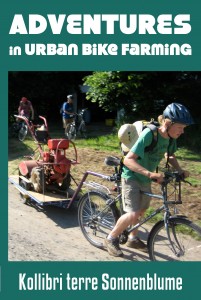If you’ve lived in Portland long enough you’ve probably caught site of someone on a bike hauling yard and home improvement tools around. We have organizations that plant trees by bike, businesses that do landscaping and carpentry by bike, and we even have farmers who’ve replaced the iconic work-truck with a work-bike.
One of those farmers, Kollibri terre Sonnenblume, has now written a book about it. Adventures in Urban Bike Farming from Macska Moksha Press is what Sonnenblume calls, “Equal parts historical document, confessional memoir and social critique.”
Don’t let the title of the book fool you, based on an excerpt made available by the publisher Sonnenblume has just as many insights to share about Portland’s cultural upheaval in the past decade as he does about how to increase potato yields. “If you’re looking for a message of ‘rah rah, look how sustainable we are!’,” he says, “you won’t find it here.”
Sonnenblume moved to Portland in 2001 as an activist drawn to our town’s indy vibe, affordable housing, and reputation as “Little Beirut.” It was several years later that he found his place as an urban farmer. By the time he started Sunroot Gardens in 2007, Sonnenblume had already seen Portland change dramatically. But even so, his community supported agriculture business thrived. At its peak he and his crew cultivated 50 plots across three acres of urban land that provided food for over 24 households.
Advertisement
Sonnenblume and his bike were the toast of the local media — even as their coverage was a hint of what was to come: Portland Monthly magazine called him an “ecofreak” and “slightly insane.”
Then things started to change. In a very familiar story to those following Portland’s urban evolution. Here’s how Sonnenblume describes it in his introduction:
“The Portland that emerged next was “Portlandia,” a caricature of itself, a destination no longer for scrappy activists—or starving artist, their sometimes partners-in-crime—but for the app-driven digerati, with their oh-so-refined tastes and non-confrontational blue-state politics. Rents skyrocketed, hipsters pushed out hippies, and by 2015, Portland was the most quickly gentrifying city in the U.S.A. In short, no longer a hospitable place for unconventional experiments.”
Sonnenblume shut down Sunroot Gardens in 2010. By that time, he writes, “Urban farming as a meme had lost its luster and the practice itself had been relegated to the role of one more quirky thing that existed to ‘keep Portland weird.'”
Beyond the social critiques the book should serve as a great resource for anyone interested in urban, collective agriculture and its role in cities.
The book is available in paperback from Amazon or as a digital download (featuring 100 color photos) from Macska Moksha Press.
— Jonathan Maus, (503) 706-8804 – jonathan@bikeportland.org


